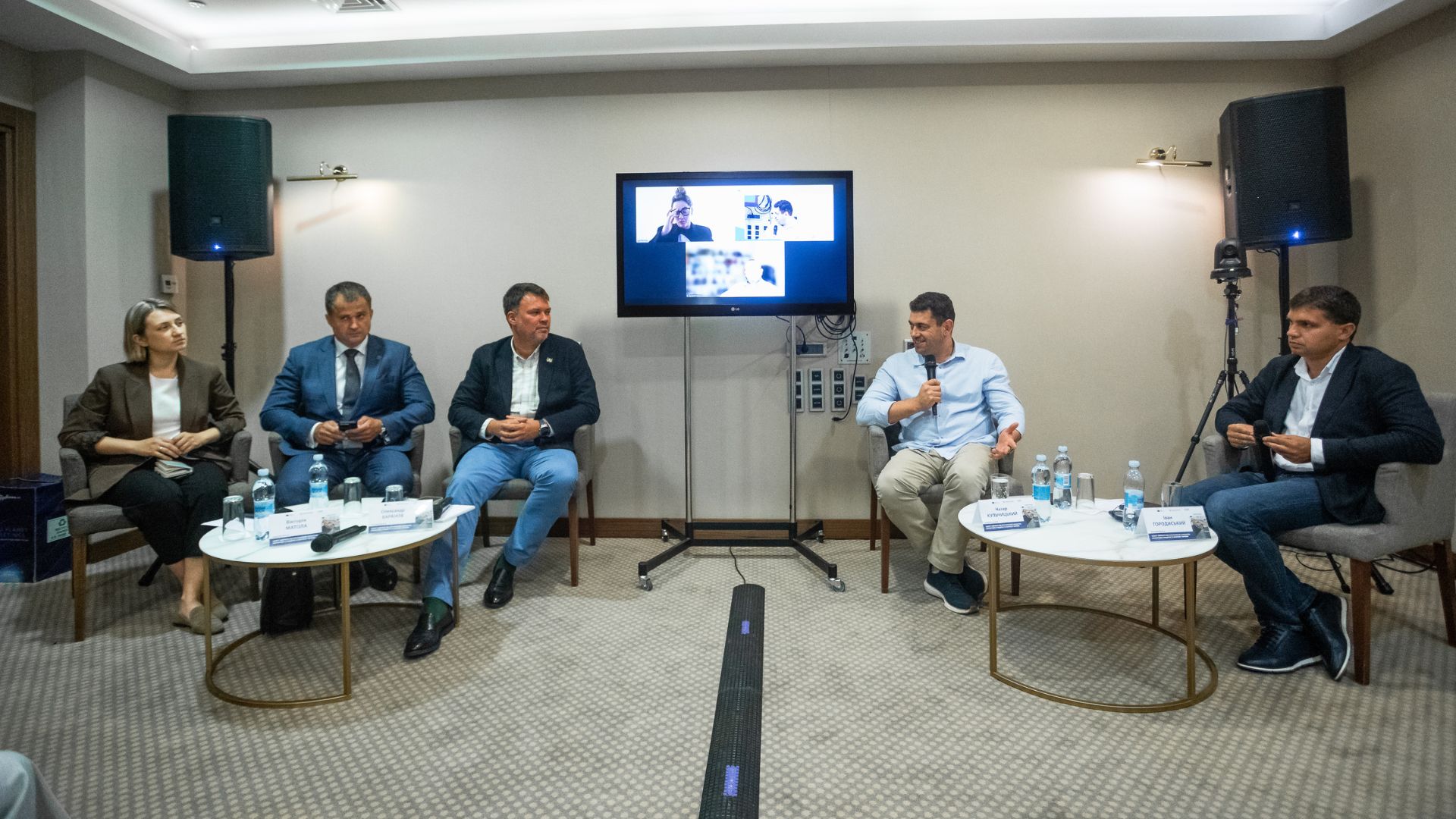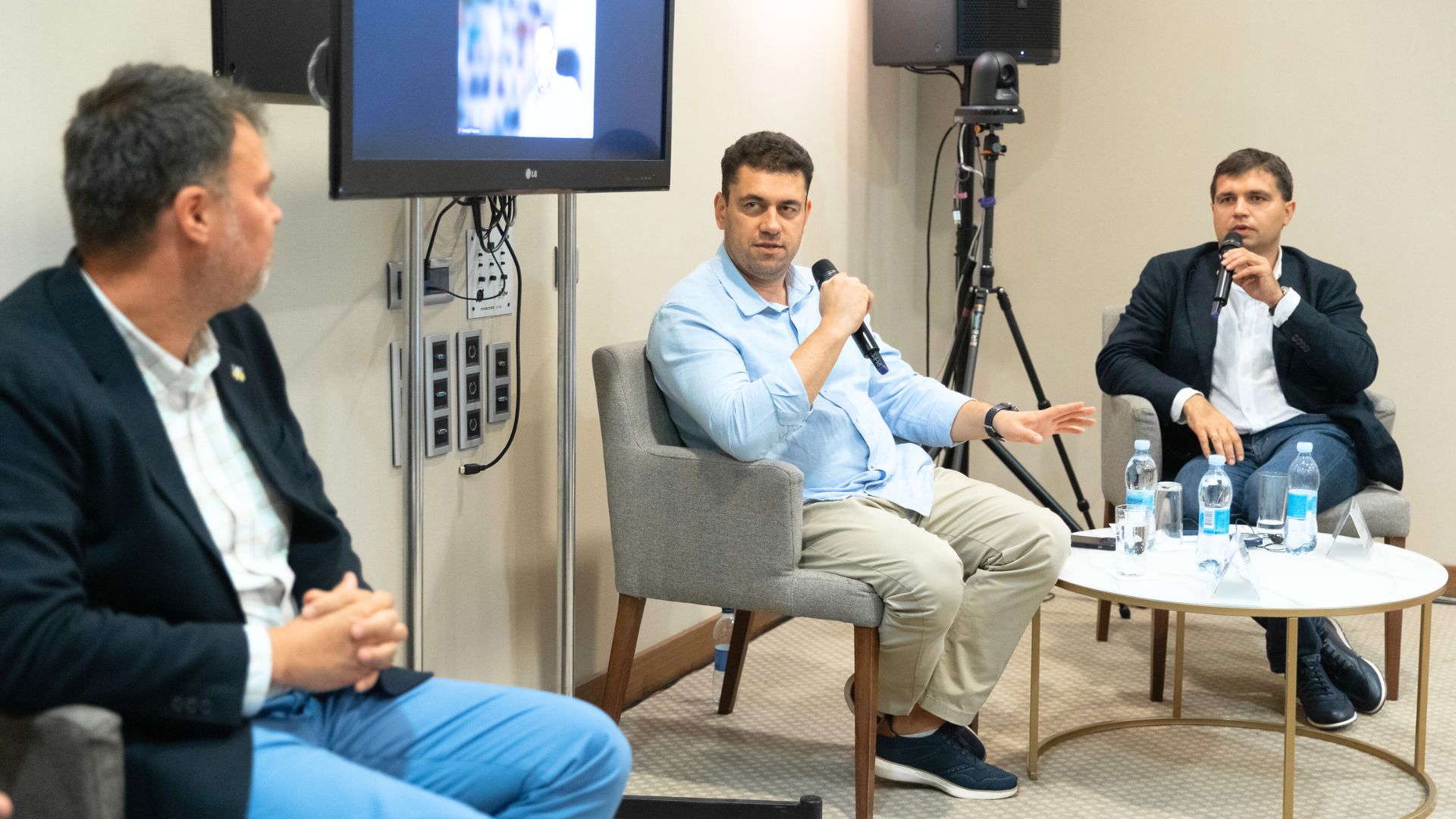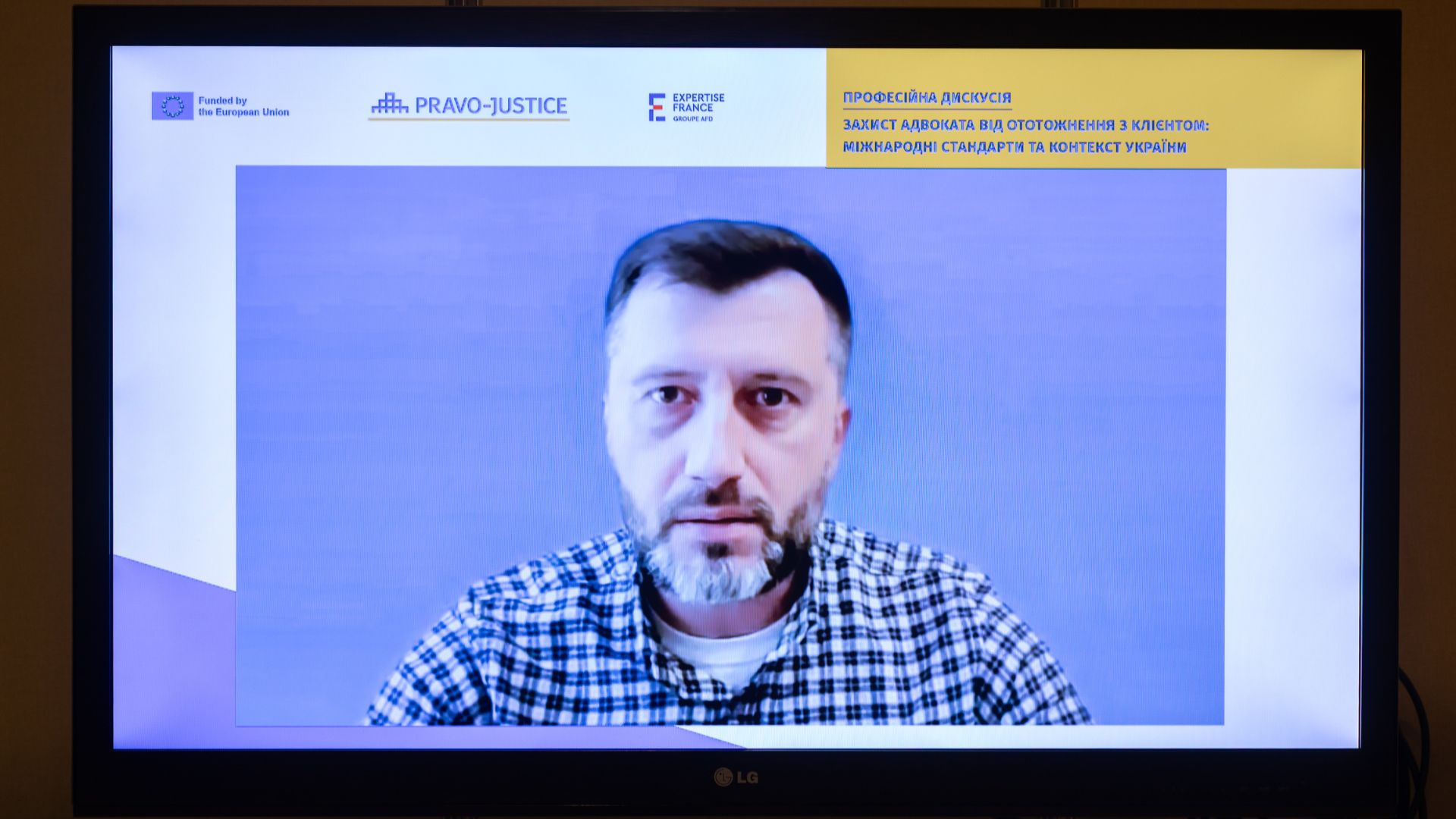Protecting Lawyers from Identification with Their Clients: International Standards and the Ukrainian Context
On 8 September 2025, a professional discussion was held on the topic “Protecting Lawyers from Identification with Their Clients: International Standards and the Ukrainian Context”, organized by the EU Project Pravo-Justice.
The event brought together representatives of state institutions, the bar, specialized civil society organizations, the media, and international partners for a substantive discussion on the challenges associated with the identification of lawyers with their clients in both societal and professional dimensions.

Moderated by Maya Cvitan Grubišin, Head of the “Support to the EU Integration Process in the Justice Sector” component of the EU Project Pravo-Justice, the event was opened with introductory remarks by:
-
Volodymyr Vatras, Member of Parliament of Ukraine, Chair of the Subcommittee on the Organization and Activities of the Bar and Legal Aid Bodies of the Verkhovna Rada Committee on Legal Policy;
-
Asier Santillán Luzuriaga, Head of Section, Delegation of the European Union to Ukraine;
-
Viktor Dubovyk, Director General of the Directorate for Legal Policy, Office of the President of Ukraine;
-
Oleksandr Oliinyk, Director of the Directorate for Justice and Criminal Justice, Ministry of Justice of Ukraine;
-
Lidiia Izovitova, Head of the Ukrainian National Bar Association;
-
Oksana Tsymbryvska, Team Leader of EU Project Pravo-Justice;
-
Maciej Janczak, Head of the Council of Europe Office in Ukraine.
Oksana Tsymbryvska, Team Leader of the EU Project Pravo-Justice, noted that the discussion is timely in light of the adoption of Draft Law No. 12320 on the protection of lawyers’ rights, which is currently awaiting the signature of the President of Ukraine, as well as the ongoing preparations for the ratification of the Council of Europe Convention on the Protection of the Profession of Lawyer.
At the same time, she emphasized that the law has generated mixed reactions: it is supported by the bar self-governance bodies, while civil society and the media have expressed concerns regarding potential risks to freedom of expression. That is why the EU Project Pravo-Justice established this platform and initiated the discussion in a broad format — involving the bar, representatives of state institutions, Parliament, international partners, civil society, and the media.
According to her, such an inclusive approach makes it possible to hear all perspectives, assess the risks, and move closer to a balanced solution — one that guarantees the protection of lawyers’ rights while also safeguarding freedom of expression.
Moderated by Ivan Horodyskyi, Key National Expert of the EU Project Pravo-Justice, the participants discussed the issue of identifying lawyers with their clients in high-profile cases.

Identification of Lawyers with Their Clients as a Symptom of Deeper Societal Issues
Oleksandr Baranov, Director of the Coordination Centre for Legal Aid Provision, emphasized in his remarks that the phenomenon of identifying lawyers with their clients is not the root cause of the problems, but rather a manifestation of deeper issues. In his view, the core of the problem lies in the low level of legal culture and society’s predisposition to perceive even the most basic statements as grounds for equating a lawyer with their client.
The speaker cited data from a United Nations report: only 40% of Ukrainians continue to believe that Russian defendants have the right to legal defense, while 60% support denying such defense. In this environment, reactions to lawyers’ professional activities quickly become emotionally hostile.
Another significant factor identified by Oleksandr Baranov is the lack of effective communication with the media. According to him, journalists often state: “We do not have sufficient information, so we write what we think.” He cited an example where a lawyer was accused of “sabotaging a court hearing” merely for filing a motion to hold the proceedings in closed session — a fully lawful procedure. Nevertheless, in the perception of some journalists, the blame was placed on the lawyer.
He also referred to the case of Vadym Shyshimarin, where after the appellate court reduced the sentence from life imprisonment to 15 years, a wave of criticism was directed against the judges. Mr. Baranov pointed out that although there may not have been direct identification in this instance, the association nonetheless arose.
The number of lawyers currently providing defense in war crimes cases is around 300 — significantly fewer than those representing victims. Heavy caseloads, social pressure, and even threats are among the main reasons for this imbalance.
At the same time, the speaker stressed the importance of careful use of terminology. For example, the phrase “lawyer of the occupier” creates negative attitudes toward the professional on an emotional level. Similarly, even a seemingly minor shift in wording — such as saying “the person is innocent” versus “the person’s guilt has not been proven” — though legally equivalent, is perceived differently by society and can shape its attitude toward the lawyer.

Victoria Matola, Editor-in-Chief of the media outlet Watchers, emphasized the importance of communication in shaping public perceptions of lawyers in high-profile cases. She underlined that when a lawyer mentions their appointment through the Free Legal Aid (FLA) system, it sends a clear signal to journalists and society that human rights standards are being upheld. Such a statement serves as a guarantee that Ukraine strictly complies with its international and constitutional obligations, particularly in cases involving prisoners of war.
The participant cited the high-profile case concerning the murder of Andrii Porubii, where a lawyer, without commenting on the merits of the case, told journalists only one phrase: “I am from the FLA. You know — that is the guarantee.” This alone was sufficient to convey the lawyer’s professional role.
She also noted that legislative initiatives must be based on prior professional discussion. In her words, it is unacceptable to create a “law named after a blogger” solely on the basis of isolated cases of identifying lawyers with their clients in the media. In her ten years of experience in court journalism, she personally has never engaged in such identification and considers such conclusions to be nonsense.
Ms. Matola also cautioned against attempts to regulate speech on social media, which is characteristic only of authoritarian regimes. She stressed that Ukrainian democratic society cannot take its cue from posts in regional media; rather, regional outlets should be guided by the standards set by nationwide publications.
She emphasized the lack of systematic communication between journalists, lawyers, judges, and prosecutors. For example, in the cases of Sheremet and the Maidan judges, public outrage was directed not only at lawyers but also at prosecutors and judges — without any in-depth analysis of their decisions.
Matola also shared an example from her own experience: after publishing an article on a verdict in a war crimes case, the court contacted the newsroom requesting the removal of photos of trial participants, even though the hearing had been open to the public. In her view, potential risks should be flagged in advance, not after the material has already been published.
In concluding her remarks, she stressed that laws cannot be adopted on the basis of isolated complaints or subjective opinions expressed on social media. The legal profession is not always aligned with society’s demand for emotional responses. Moreover, in the context of public life, where lawyers may also serve as members of parliament or politicians, it is crucial to teach society to distinguish between a lawyer’s professional duty and their personal beliefs.

Lawyer Nazar Kulchytskyi shared a practical perspective on the problem of identifying lawyers with their clients, emphasizing that this phenomenon has always existed and continues to persist — not only with respect to lawyers but also judges and prosecutors. In his view, associating a legal professional with specific actions or decisions is an inevitable aspect of public perception, particularly in high-profile cases.
As an example, he referred to cases before the High Anti-Corruption Court (HACC), where civil society organizations — in particular, the Anti-Corruption Action Center — often publish materials with formulations such as “this judge once again released a criminal from custody”, thereby creating a persistent association between the judge and certain past rulings.
A similar situation applies to prosecutors: even when they recognize that a case should be reclassified or that a plea agreement would be legally and resourcefully appropriate, they often refrain from doing so out of fear of media pressure and accusations of “burying the case.” In situations where an acquittal is issued, the risk of becoming the target of criticism can remain for years.
According to Nazar Kulchytskyi, lawyers face a similar situation. On an everyday level, identification with clients occurs regularly — but most often it is short-term in nature. A lasting “negative trace” tends to arise in two cases: when the media deliberately create pressure around a particular case or individual, or when a lawyer becomes associated with toxic figures or organizations — in which case negative attention becomes systemic.
The speaker also addressed the issue of lawyers’ public engagement. He reminded the audience that a lawyer is not obliged to comment on a case to journalists, noting that a lack of understanding of these professional boundaries often becomes the basis for unfounded accusations. A lawyer acts strictly within the scope of their professional duty — regardless of whether they are appointed through the Free Legal Aid system or retained under contract. At the same time, lawyers who themselves choose to step into the public sphere must be prepared to face criticism.
Mr. Kulchytskyi also drew attention to cases related to war crimes. In such proceedings, society often equates the defense of a suspect with the justification of the occupier’s actions. For this reason, lawyers tend to avoid making public comments: additional media mentions contribute neither to their reputation nor to their remuneration. A lawyer performs their professional duty — and that is sufficient.
Yurii Rodzeievskyi, lawyer and one of the co-authors of the draft law introducing administrative liability for violating the guarantee of non-identification of lawyers with their clients, emphasized in his remarks that the issue of identification is already regulated — such a prohibition is expressly provided for in the Law of Ukraine “On the Bar and Practice of Law.” However, the main problem lies in the fact that this guarantee is not implemented in practice and is effectively ignored.
In his remarks, the speaker addressed concerns about a possible restriction of freedom of expression: “Ukraine already has restrictions on public statements — for example, public approval of Russia’s aggression, insults, or calls for the overthrow of the constitutional order. Why then should a prohibition on identifying a lawyer with their client be considered a violation of freedom of expression? It is the same protected category.”
Mr. Rodzeievskyi stressed that the issue is not about prohibiting references to lawyers in connection with certain cases, but about preventing situations where such identification becomes grounds for pressure, discrediting, or attempts to remove a lawyer from the case. According to the draft law, such situations should be subject to consideration by the Bar Council of Ukraine, in a procedure analogous to that applied when reviewing complaints concerning failure to respond to a lawyer’s request.
Artem Donets, a lawyer with over 10 years of experience, drew attention to the need for a deeper analysis of the issue of identifying lawyers with their clients. He noted that while this phenomenon is undoubtedly prohibited and may have serious consequences, not every statement about a lawyer automatically amounts to such identification.

Using the example of the statement “Medvedchuk was Stus’s lawyer”, he posed the question: is this merely a fact, or does it already amount to identification, and can such a reference truly affect a lawyer’s reputation? In his view, it is not only a client’s actions that influence a lawyer’s image — often the lawyer’s own public behavior plays a decisive role.
Artem Donets emphasized that the problem of identification becomes particularly acute in cases involving the defense of military personnel — in particular, Russian soldiers or representatives of the so-called “LPR/DPR.” If a lawyer systematically works on this category of cases and the hearings are public, the question arises: does mentioning this constitute identification? And does it affect the lawyer’s professional reputation?
He also stressed that what matters is not whom the lawyer defends, but how they do it — namely, the degree of professionalism and adherence to ethical standards. Regarding the legislative initiative aimed at protecting lawyers from identification with their clients, the speaker expressed concerns about the legal drafting technique of the relevant bill, pointing to its low quality of law-making.
Inna Linova, Director of the Human Rights Institute of the Ukrainian Bar Association (UBA), highlighted the importance of public discussions on the problem of identifying lawyers with their clients. She emphasized that the proposed draft law is not the optimal way to address the issue, as Ukraine has a tendency to resolve complex matters by adopting new laws or creating institutions, while in some cases the real need lies in developing soft skills.

According to the speaker, identification of lawyers with their clients does indeed occur, particularly in cases of high public resonance, such as war crimes proceedings. Within the framework of the monitoring of such cases conducted by the Ukrainian Bar Association (UBA) since 2023, instances of pressure, hate speech, and threats directed at lawyers have been recorded. At the same time, as Inna Linova noted, the source of such identification is often not only the media but also victims — which is emotionally understandable. Therefore, it is important to develop work with victims, for example, with the involvement of the Witness and Victim Support Coordination Centre.
She also provided an example of a positive balance between judicial transparency and security: in the case concerning the execution of a prisoner of war, heard by the Zavodskyi District Court of Zaporizhzhia, live broadcasting of the hearing was permitted, but filming of the lawyer and interpreter was prohibited.
Ms. Linova drew attention to instances of identification originating even from judges and other lawyers — in particular, representatives of victims who deliberately choose such a strategy. According to her, such cases are unacceptable and must elicit an appropriate response from the professional community.
She also highlighted situations where lawyers, in their public statements or in court, repeat Russian narratives. This raises the question: where is the line between procedural defense and propaganda? In her view, this issue should become the subject of an internal professional discussion.
Inna Linova also stressed the importance of ratifying the Council of Europe Convention on the Protection of the Profession of Lawyer, but urged not to wait for international instruments and instead to begin strengthening national legal culture now. She also raised the issue of translating the title of the Convention — suggesting that it should be adapted to reflect the protection of the “legal” or “juridical” profession more broadly, so as not to limit its scope exclusively to the bar.
A video recording of the discussion is available on the YouTube channel of the EU Project Pravo-Justice at the following link.

